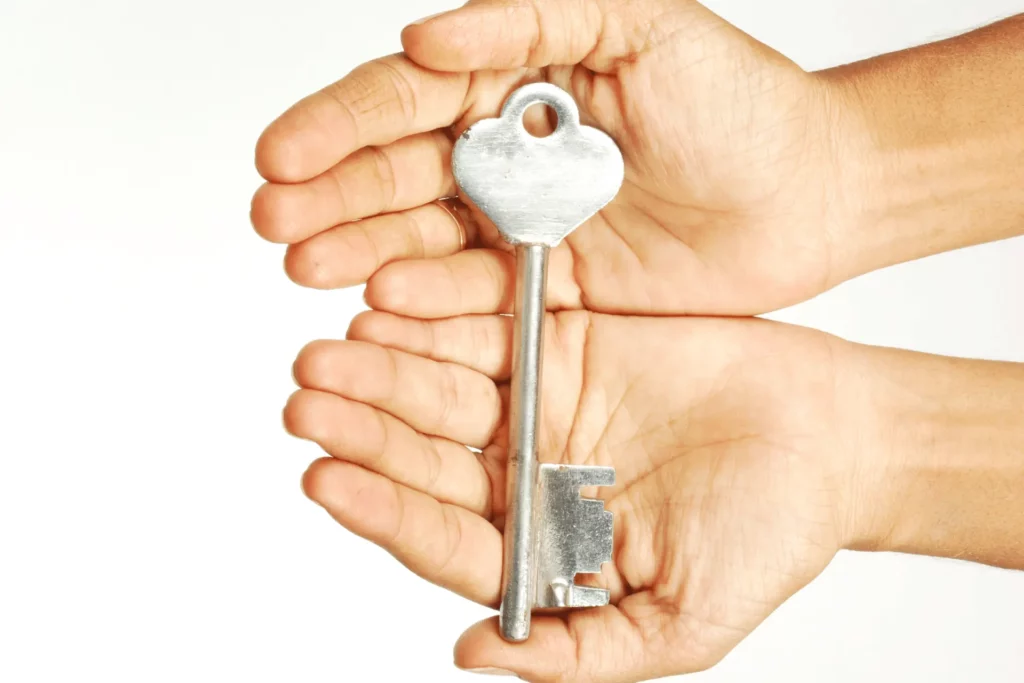Inhaltsverzeichnis
- Where did all the dreams go?
- What exactly does self-responsibility mean?
- Determined by others: The social “normal”, which is rarely questioned
- Why people with self-responsibility make their bed in the morning – and why this stabilises our nervous system
- What does self-responsibility mean in concrete terms?
- Game changer for your self-responsibility in an externally determined world
Self-responsibility begins where heteronomy ends.
Only those who follow their inner voice act responsibly. Morality is an escape from responsibility.
Andreas Tenzer
Do your A-levels, they said. Go to university! But something proper, they said. And get married, they said. Build a house, they said. Have two children, they said.
My client, in her mid-50s, sits in front of me in tears. She was always good. Did what she was told. And I’m sure she meant well. Now she’s sitting here. With depression. With dreams. With fear. With doubts.
She actually wanted to study music. Not business studies. Marriage? She never wanted to. Children? Maybe later. A house? No. She wanted to travel. Back then. In her early twenties.
Where did all the dreams go?
Yes, where have they gone? Disappeared? More like buried. Under all the expectations. And the original good wishes. Our own experiences and lived conditioning in the family, perhaps from friends, teachers, acquaintances. And the socially-recognised expectations (A-levels, studies, marriage, building a house, children).
There is nothing fundamentally wrong with that. Where it gets complicated is the unconsciously imposed “good advice” that we follow when “life really begins”. We don’t give it much thought. We just do it. Even if our inner feelings tell us otherwise. We don’t trust that. Because there are no role models for “another life”.
But the dreams… they live on. Because dreams are not meant to be given up.

What exactly does self-responsibility mean?
Some of you may have heard of self-management. But self-responsibility?
Essentially, the word consists of two parts: the self and responsibility.
The self is our core. Psychology calls it “the centre of the human personality”.
Responsibility is ultimately the knowledge of our skills, abilities and experiences that allow us as human beings to make decisions – and take action. This also includes the deep knowledge of our gut brain. Independent action and the consequences thereof = self-responsibility.
The connection between “self” and “responsibility” becomes particularly clear when we look at the term “self-responsibility”. Self-responsibility is the awareness of the self of its role and its duties to take responsibility for its actions and decisions. It means that the individual – the “self” – takes control and responsibility for their own life.
It recognises that one’s decisions and actions have a direct impact on personal well-being and the quality of life. It is the ability of the self to make choices and accept the consequences of those choices. It is also the commitment of the self to learn from experience and constantly evolve. In this sense, self-responsibility is an expression of self-determination and personal autonomy.
To put it bluntly, for example:
You have resolved to finally eat healthily, i.e. less “something” on the side – and instead cook more yourself. Fresh. Organic. From the market. At the beginning, everything is going great, you enjoy shopping at the market, trying out new recipes and feeling good. The food is really good for you and you can feel it in your body, you sleep more relaxed and your skin is much clearer.
And then comes a super-stressful day after your holiday and you just want to grab a quick pizza from the chiller cabinet in the evening.
Now you might say, “Oh, I’ve had a hard day, I deserve this” or “I don’t have time to cook”. But deep down you know that these are excuses.
Self-responsibility in this moment means saying: “No, nothing there.” You go home, cook yourself a simple, delicious meal and feel great afterwards. That’s self-responsibility – you take control of your decisions and stand by them, even if it’s hard sometimes.
But the world is not an Instagram pony farm. Our world is essentially governed by heteronomy. This is considered the “normal”. Unfortunately, it is very often not even questioned. Why? We learn from an early age “how the world works” – why should we question this? Grandma, grandad and even before that – life has “always been like this”. Or has it?
Or.
Social heteronomy starts early in our own lives and goes on and on. If what we do is not wanted and determined by ourselves. For example:
- Childhood: A child is pressurised by their parents to learn an instrument even though they would rather play sport
- School time: A pupil should concentrate on science subjects to compensate for his poorer grades, even though his passion lies in languages
- Teenagers: A teenager is pressured by friends to try risky behaviours such as smoking or drinking, even though they refuse to do so
- Adulthood: A person stays in an unfulfilling job because the family or society expects them to be financially successful, even though they would rather work creatively
- Nutrition: A vegetarian is urged to eat meat in a group of meat eaters, although he refuses to do so for personal reasons
- Health: Someone is pressurised by the family to pursue a particular medical treatment even though they would prefer an alternative method.
- Relationships: An adult is pressurised by his parents to marry someone they deem suitable, even though he loves someone else.
- Career: An employee is pressurised by his boss to work overtime and take on projects, even though he is already overworked and would rather spend more time with his family
These are all small daily examples of how we are determined by others, as it appears “normal” to most people. But it is not: normal. It has been made into our NORMAL through many years of conditioning and being passed on from generation to generation.
External control is the opposite of self-determination and therefore also of self-responsibility.
However, we often run completely on autopilot and simply do what we are told or told to do. What we “have to do” and what we “shouldn’t do”. Of course, this also depends on the culture, but the basic alienation remains similar. We don’t realise that behind all the well-intentioned advice and tips are usually the fears of others (“I wouldn’t travel alone if I were you”). We allow ourselves to be unsettled and “give in”. Just as we are all expected to do.
In most cultures – even in so-called “progressive cultures” – for example, “not being married” is a very hot topic (“there’s something wrong with her”). Which in turn means that many people – even quite unconsciously – never cross the 28-year age limit without being married.
We usually only realise – or become aware of – this later. And this realisation is usually accompanied by a major crisis. “I actually never wanted to get married.” “I never wanted to study business administration, but it’s safer…” “I didn’t choose my job.”
These are all statements from people who have not followed their own personal responsibility for what they want or don’t want – or did so late. Suddenly an old life is abandoned, completely turned upside down, finally lived authentically. An engineer becomes an artist who paints on large canvases, an entrepreneur becomes an alpine shepherd, a housewife becomes a respiratory therapist.
How does someone who – consciously or unconsciously – acts under the control of others feel?
- Powerless: controlled (by others) and without influence over own actions
- Frustrated: Own wishes and needs are ignored
- Dissatisfied: Actions do not correspond to personal values
- Stress and anxiety: pressure and nervousness due to constant adaptation to other people’s expectations
- Worthless: own needs are not considered
- Alienated: and inauthentic – true identity is suppressed
- Resigned: no motivation left
- Inwardly torn: Conflict and anger due to contradiction between action and personal conviction
- Dissatisfied: due to a lack of self-responsibility
- Dependent: on the need for approval and acceptance from others

Why people with self-responsibility make their bed in the morning – and why this stabilises our nervous system
Making your bed will also reinforce the fact, that little things in life matter. So if you want to change the world, start off by making your bed.
By Admiral William H. McRaven
What does self-responsibility have to do with the bed we make?
A lot: we start the day with a small and very effective routine. The first small task is done. The bed looks cosy and snug, fresh bed linen invites you to spend the evening. A lovely feeling.
A feeling of (external and internal) order. A bit of control in your own life. Stability. Our nervous system receives the impulse “All is well here”. And that takes the stress away. We start the day relaxed.
Self-responsibility means first and foremost taking care of yourself. And you do this first thing in the morning with a structure that calms the nervous system: your bed is freshly made, it is aired, the bed linen is fresh and washed once a week. You take care of your well-being. And that’s where personal responsibility begins: With yourself.
What does self-responsibility mean in concrete terms?
- Self-initiative: completing tasks independently without waiting for someone else to assign them to you
- Self-confidence: being aware of your own abilities and applying them in different situations
- Consequences: admitting mistakes and learning from them instead of blaming others
- Goal-orientation: setting personal goals, such as completing a course or achieving a fitness goal
- Self-care: exercise regularly, eat healthily and get enough sleep to maintain your own health
- Problem solving: develop strategies to solve difficulties instead of ignoring or postponing the problem
- Self-reflection: regularly question your own behaviour and decisions and adjust them if necessary
- Autonomy: making your own decisions, even if they go against the opinion of others, such as changing jobs
- Integrity: acting in accordance with your own values, even if it is uncomfortable, e.g. telling the truth, even if it is unpleasant
- Self-improvement: active personal development, e.g. through further training or learning new skills
What effects does self-responsibility have on a person? How does he feel?
- Self-confident: strong and capable – through control over one’s own life
- Satisfied: feels fulfilment through the achievement of self-imposed goals
- Independent: free and unattached as they are not dependent on the approval of others
- Resilient: resilient to setbacks as they know they have the control to improve situations
- Authentic: genuine and truthful as they live by their own values and beliefs
- Positive: has a positive attitude as they actively shape their life circumstances
- Self-worth: valuable and important as they take their own needs and wishes into account
- Motivated: inspired as they have control over their goals and dreams
- Peace: experiences inner peace as they take responsibility for their own happiness
- Self-confidence: confident in their decisions and actions as they have determined them themselves
Game changer for your self-responsibility in an externally determined world
In a world where everything is determined by others, it is important to know yourself. That sounds simple – and it is, but then again, it’s not. Where do you start? How can you know who you really are?
Define your values: What is important to you? What is not possible? What makes you feel good? When are you in turmoil?
Perceive and feel: Daily introspection into what is good for you and what is not is essential! Why? Because otherwise you won’t be able to feel your limits.
Set your personal boundaries: And do it where your gut brain says “no” or “stop”.
Work with a mentor: Not because you can’t do it alone. But because a professional counterpart can give you valuable tips and mirror you and your limits in a “practice room”, helping you to quickly become stable
There are many roads to Rome. The important thing is to be clear about where you stand on the scale of self-responsibility – and where exactly you are still under the control of others. And then move the pointer bit by bit.
I would be very happy to accompany you – just book an initial consultation with me.
I wish you many insights for yourself.
All the best, Christine


